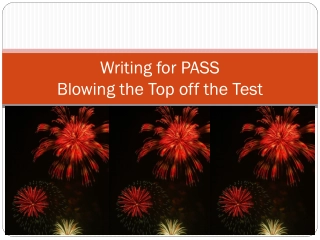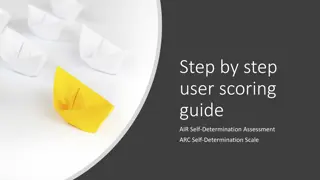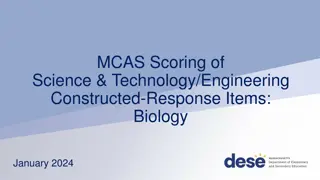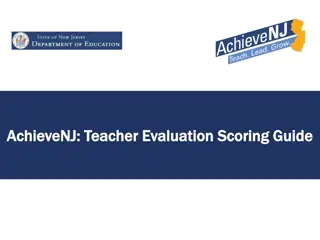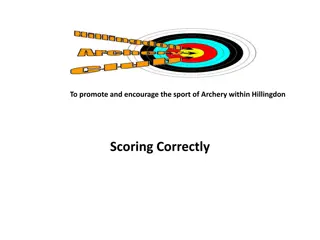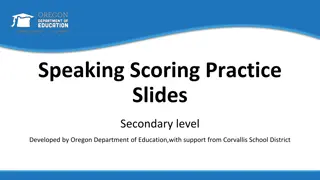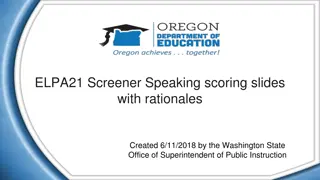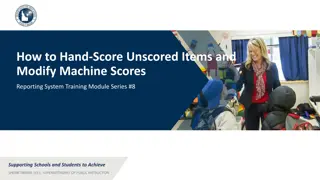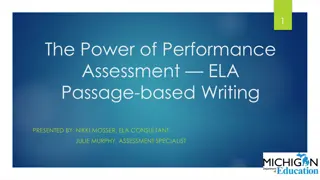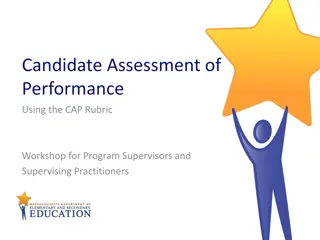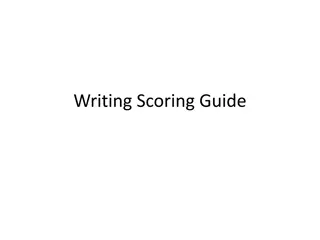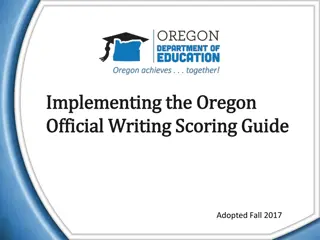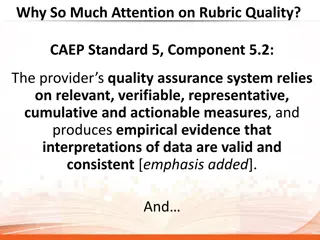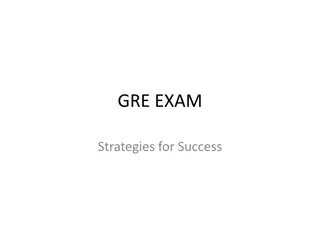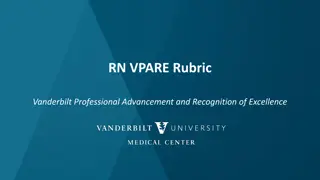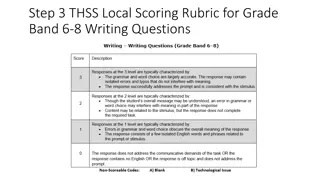Scoring Rubric Tips for Effective Writing
Gain insights on interpreting scoring rubrics, brainstorming for expository writing, and avoiding common mistakes. Understand the importance of taking risks and crafting a strong thesis statement. Learn body paragraph strategies and the significance of using third-person perspective in writing.
Download Presentation

Please find below an Image/Link to download the presentation.
The content on the website is provided AS IS for your information and personal use only. It may not be sold, licensed, or shared on other websites without obtaining consent from the author.If you encounter any issues during the download, it is possible that the publisher has removed the file from their server.
You are allowed to download the files provided on this website for personal or commercial use, subject to the condition that they are used lawfully. All files are the property of their respective owners.
The content on the website is provided AS IS for your information and personal use only. It may not be sold, licensed, or shared on other websites without obtaining consent from the author.
E N D
Presentation Transcript
Understand scoring rubric Brainstorm relevant information and valid inferences Gain knowledge about effective writing techniques Understand common mistakes to better plan for your next expository writing Create an outline to prepare for writing process
Take a look at your scoring rubric, and read the highlighted portions (this is why you received this score)
Write an essay explaining why it is sometimes necessary to take a chance. Rank these examples as possible answers to the prompt (these were ACTUAL examples in student work): 1) Disneyland 2) Avoid Failure 3) Wearing shorts 4) Stuff 5) Skydiving 6) Steve Jobs 7) Skipping breakfast 8) Hunger Games 9) Success 10)Coffee 11) Crossing the Street 12) Things 13) Albert Einstein 14) Prevent injury 15) Neil Armstrong 16) Roller Coaster 17) Colonization of America 18) Physical/Mental risks 19) Playing Rookie Quarterback 20) Something Scale: 1-5 1= WEAK 5= STRONG
Weak Thesis statement/not answering the question Question: Write an essay explaining why it is sometimes necessary to take a chance. Risks can be good but are mostly bad. Taking a chance can have a positive or bad outcome. It really depends on what your taking the risk on. ** It is sometimes necessary to take chances, so a person can live a life full of excitement and rewards **
Too general body paragraphs/ no explanation Taking risks will teach you a lot about life, and help you be willing to try new things. It takes a small risk for a small reward, it is good but you are taking small baby steps. Small baby steps will help, but the bigger the risk the bigger the reward. ** Be specific with your examples **Connect back to your thesis**
Using you ** Speak in third person, avoiding I/me/my and you/your/yours ** - EX: You need to take risks to gain success. - EX: Everyone needs to take risks to gain success. - EX: If you want to learn from your mistakes, you must take chances. - EX: If a person wants to learn from his or her mistakes, he or she must take chances .
Jumping from one example to the next without explaining why it s necessary For example, Christopher Columbus took a risk when he discovered America. Also, Steve Jobs took a risk when he designed Apple. Finally, Nelson Mandela took a risk with Freedom. *If you give an example, be sure to explain the connection to the thesis, giving SPECIFIC commentary*
Why do we outline? Organize and accurately convey information Make points clear and explain ideas thoroughly Brainstorm possibilities Easy Four-Step Process!
Lets brainstorm for this prompt: English class is a mandatory class in High School. Write an essay explaining why its important to take English classes. Where do I start? A List!! Make a list of as many ideas as you can! **Make sure these ideas can answer the prompt clearly**
Formulate a thesis statement using 2-3 of your ideas This is going to be the big idea of your paper. It will tell your reader: What they will be reading about The organization of your paper Your ideas/side on the subject EX: Taking an English course is important to a student s education because speaking and writing properly is a sign of professionalism in the real world. EX: If a person wants to be successful in a business atmosphere, he or she must take an English class. EX:
Once you have ideas and a thesis Begin outlining your body paragraphs Body paragraphs What is my topic for each paragraph? What SPECIFIC examples should I use to back this up? How can I relate this example to my thesis? How can I transition into my next body paragraph?
Conclusion How can I restate my thesis? How can I leave my reader feeling satisfied and that I answered the prompt? What do I want my reader to walk away with?
Step 1: generate a list of ideas Step 2: develop a thesis using your ideas and your thoughts on the prompt Step 3: construct body paragraph topics Step 4: Tie up loose ends in a conclusion
Pick two prompts and create and outline Write an essay explaining why having a job during high school helps a person s future. Write an essay explaining why Austin, Texas is a great place for young people to live. Write an essay explaining how technology has changed our lives for the better. Write an essay explaining why a cat or dog is better than the other. Write an essay explaining why it s important to change the world.


